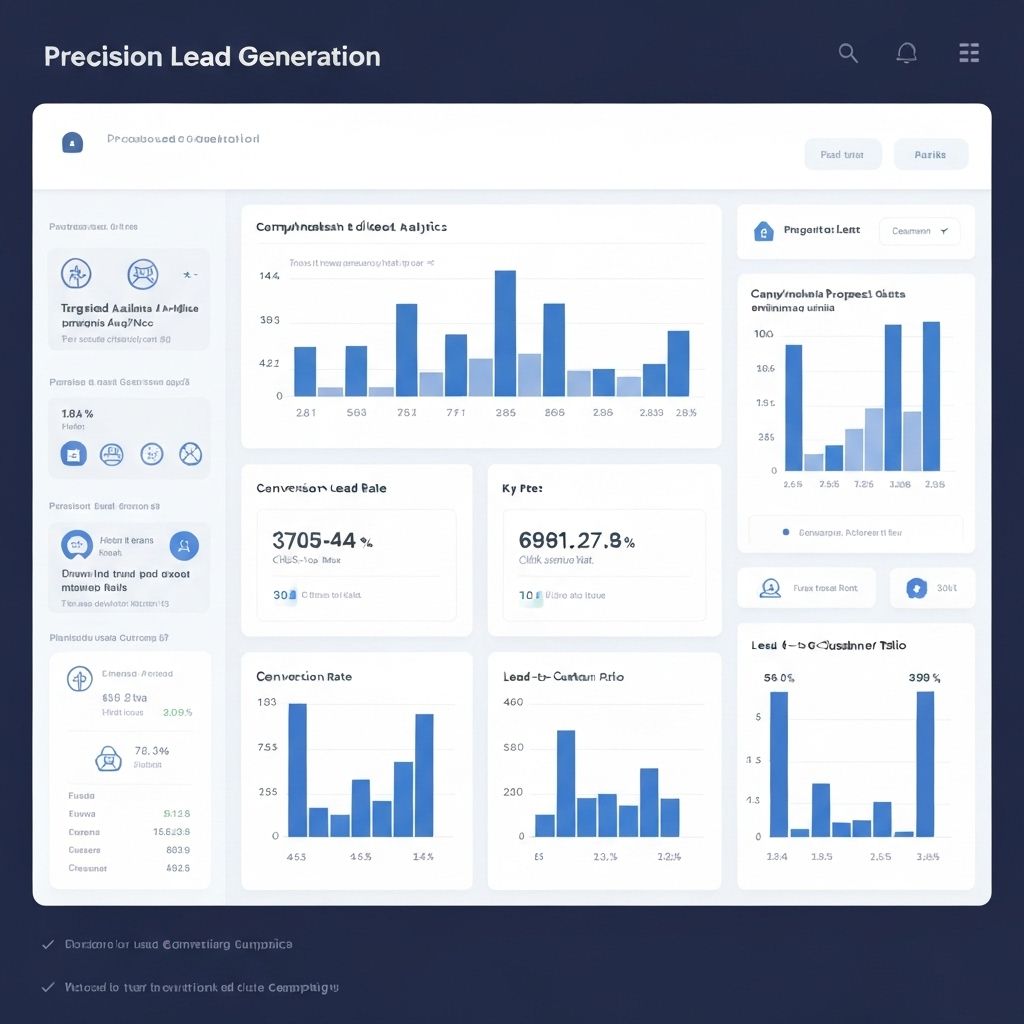
Precision Lead Generation Strategies: Advanced Targeting and Qualification Techniques
Master sophisticated lead generation methodologies that combine data-driven targeting, behavioral analysis, and automated qualification to deliver high-quality prospects at scale.
Precision lead generation represents the evolution of traditional lead generation methodologies, leveraging advanced data analytics, machine learning algorithms, and sophisticated targeting capabilities to identify and engage high-quality prospects with unprecedented accuracy. In today's competitive business environment, generic lead generation approaches fail to deliver the quality and efficiency required for sustainable growth, making precision targeting and qualification essential for successful customer acquisition strategies.
Data-Driven Prospect Identification
Modern precision lead generation begins with sophisticated data analysis that identifies ideal customer profiles and prospect characteristics with mathematical precision. Advanced analytics platforms process vast amounts of demographic, behavioral, and firmographic data to create detailed prospect models that guide targeting strategies and resource allocation decisions.
Predictive modeling techniques analyze historical customer data to identify patterns and characteristics that correlate with successful conversions. These models enable proactive prospect identification that focuses resources on individuals and organizations most likely to become valuable customers, dramatically improving lead generation efficiency and ROI.
Intent data analysis provides real-time insights into prospect behavior and purchase readiness, enabling timely engagement when prospects are actively researching solutions. This approach transforms lead generation from reactive to proactive, capturing prospects at optimal moments in their buying journey when conversion probability is highest.
Advanced Targeting and Segmentation
Precision lead generation employs sophisticated segmentation strategies that go beyond basic demographic categories to incorporate behavioral patterns, psychographic characteristics, and contextual factors that influence purchasing decisions. These multi-dimensional targeting approaches enable highly personalized engagement strategies that resonate with specific prospect segments.
Account-based targeting strategies focus resources on high-value prospects and organizations that represent the greatest revenue potential. This approach requires detailed research and analysis to identify key decision-makers, understand organizational dynamics, and develop targeted engagement strategies that address specific business challenges and objectives.
Lookalike modeling expands addressable audiences by identifying prospects who share characteristics with existing high-value customers. Advanced algorithms analyze multiple data points to find similar prospects who may not be immediately obvious through traditional targeting methods, expanding reach while maintaining quality standards.
Behavioral Analysis and Intent Recognition
Understanding prospect behavior patterns and intent signals is crucial for effective precision lead generation. Advanced analytics platforms track and analyze digital footprints, engagement patterns, and content consumption behaviors to identify prospects who demonstrate genuine interest and purchase intent.
Website behavior analysis reveals valuable insights about prospect interests, pain points, and decision- making processes. Heat mapping, session recording, and conversion path analysis provide detailed understanding of how prospects interact with content and what factors influence their engagement and conversion decisions.
Social media monitoring and analysis identify prospects who engage with relevant content, participate in industry discussions, or demonstrate interest in competitive solutions. These social signals provide additional context for prospect qualification and enable more targeted and relevant engagement strategies.
Multi-Channel Engagement Strategies
Precision lead generation requires coordinated multi-channel engagement strategies that reach prospects through their preferred communication channels and touchpoints. Integrated campaigns across email, social media, content marketing, and direct outreach create multiple opportunities for engagement while maintaining consistent messaging and brand experience.
Personalized content strategies deliver relevant information and resources that address specific prospect needs and interests. Dynamic content generation and automated personalization ensure that each prospect receives tailored messaging that resonates with their unique situation and decision-making criteria.
Sequential messaging campaigns guide prospects through structured engagement sequences that build relationships and trust over time. These nurturing campaigns combine educational content, social proof, and strategic calls-to-action to move prospects through the sales funnel at their own pace while maintaining engagement and interest.
Automated Qualification and Scoring
Advanced lead scoring systems automatically evaluate and rank prospects based on multiple criteria including demographic fit, behavioral engagement, and intent signals. These automated qualification processes ensure that sales teams focus their efforts on the most promising opportunities while lower-scored leads continue to receive nurturing until they demonstrate higher conversion potential.
Machine learning algorithms continuously refine scoring models based on conversion outcomes and feedback from sales teams. This adaptive approach improves qualification accuracy over time and ensures that scoring criteria remain aligned with actual conversion patterns and business objectives.
Precision lead generation represents a transformative approach to customer acquisition that combines sophisticated data analytics with intelligent automation. By focusing resources on high-probability prospects and delivering personalized engagement at scale, businesses can achieve dramatically improved conversion rates and marketing efficiency.